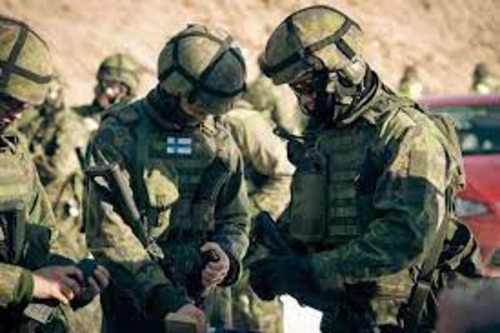Against the background of the Russo-Ukrainian war threatening to spill over to directly involve NATO, the military reservist force of Finland, Russia’s neighbor, is bleeding members. This depletion comes on the heels of a newspaper interview where Finland’s defense minister declared his intention to prohibit reservists from resigning.
In an interview with Finnish daily Kyrönmaa, published last Thursday, Finnish Defense Minister Antti Häkkänen, a member of the liberal-conservative Coalition Party, expressed his determination to “put things in order” by spring. He aims to eliminate the option of resigning from the reserves, branding such departures as an “unpatriotic” act.

Join us on Telegram: https://t.me/tfiglobal
On the following day, despite Häkkänen’s efforts to temper his stance, an unprecedented number of over 200 individuals (15 times the average) sought to depart from the reserves and enlist in auxiliary roles, providing support to the military.
Reservists opting to resign and apply for auxiliary service must demonstrate a significant shift in their convictions, hindering their participation in military activities.
Those whose applications are sanctioned are excused from military service even in a state of emergency, such as during a war. However, they are obligated to fulfill civilian service “during exceptional circumstances.”
This alternative has garnered growing appeal. By Tuesday, the cumulative count of reservists applying to leave in February alone soared to a staggering 791.
Petri Åkerman, President of the Laihian Reservists Association, finds Häkkänen’s proposition reasonable. Speaking to Kyrönmaa, he emphasized that individuals who have undergone military service have sworn allegiance and committed to defending their country in both peacetime and wartime. According to him, this serves as ample justification for the implementation of a legal ban.
Åkerman points out that Finland’s defense has, to a large extent since WWII, relied on conscripts, who afterward are automatically transferred to the reserve forces. That training, he added, would be wasted if there was no way of stopping them from leaving the reserve. “It is a huge resource that Finland, most uniquely, has at its disposal,” he added.
Civil Service Director Mikko Reijonen squarely attributes Finland’s diminishing number of reservists to Häkkänen. Offering a more detailed breakdown on Monday, he revealed that on Thursday (the day Häkkänen made the statement), 67 reservists sought service in the auxiliaries, followed by 293 on Friday, 116 on Saturday, and 130 on Sunday.
Read More: After Finland, Sweden becomes the Next NATO Victim
Reijonen further disclosed that in January, there were 225 similar requests. Comparatively, last year witnessed approximately 1,650 individuals leaving the reserve forces, indicating that the initial days of February alone accounted for well over a third of the total applications from the previous year.
In an interview with the tabloid newspaper Iltalehti, Reijonen noted that comparable figures were last witnessed when Russia deployed its military into Ukraine in February 2022.
Another notable surge, involving 400 reservists applying, occurred last April. This coincided with Finland’s departure from its longstanding policy of military neutrality and its decision to join NATO. This move effectively doubled the land border between NATO countries and Russia to a substantial 2,600 kilometers.

Häkkänen elaborated on his statement on Tuesday, February 6th, writing on his blog, “I would like to state that there is no preparation for preventing people from leaving the reserves.”
Highlighting that the nation boasts a reserve of “900,000 military-trained Finns,” Häkkänen underscored the duty to defend the country as “the foundation of the entire society, on which other rights are built.” He further remarked:
The numbers of individuals departing are still relatively small in comparison to the reserve of 900,000 people, and this does not undermine Finland’s defense. However, there is an underlying trend suggesting that the wave of separations initiates during periods of deteriorating security. The era of danger persists, and Russia remains unpredictable. The issue itself warrants discussion—does resigning from national defense duties during a war merely amount to notification?
Characterizing his previous statements as “not the most successful this time,” Häkkänen maintained that his message aligns with that conveyed by the Finnish Defense Forces:
Individuals applying for supplementary services currently possess a legal entitlement. Nevertheless, this right should undergo scrutiny to guarantee that the capacity for self-defense is not compromised in genuine situations.
Read More: NATO Sparks World War III Fears with Shocking Move!
The current situation on Finland’s borders is fraught with tension, and Finland is poised to be the first country affected in the event of escalating tensions between Russia and NATO. This is due to Finland’s proximity to Russia, as highlighted by a senior Russian diplomat cited by the RIA news agency.
Finland’s recent decision to join NATO, after maintaining a neutral stance for decades, has drawn criticism from Russia, characterizing Helsinki as a now hostile actor in their eyes. Mikhail Ulyanov, the permanent representative of Russia to international organizations in Vienna, conveyed, “They had lived calmly and in peace and suddenly ended up between Russia and NATO as a member of that alliance, but since they are our neighbors, if, God forbid, there is some escalation, they will be the first to suffer.”
This month, Russia issued a warning to Finland concerning a new defense agreement that grants the United States extensive access near the Finnish border with Russia.
Simultaneously, Russia is set to deploy its latest howitzers to the Northern Military District, which shares borders with Finland and Norway. Sergei Chemezov, the head of the Rostec state defense conglomerate, revealed that testing for the new Coalition-SV self-propelled artillery units has been successfully completed, and mass production is already underway. The initial pilot batch is expected to be delivered by the end of 2023, as stated by Chemezov in an interview with the state RIA news agency.
In the midst of the escalating tensions already unfolding on Finland’s borders, it is disconcerting for the nation to witness a depletion in its military ranks. As Russia issues warnings and deploys advanced weaponry, Finland finds itself at the forefront of potential fallout.








